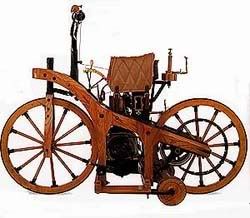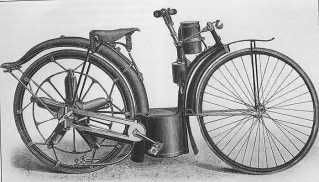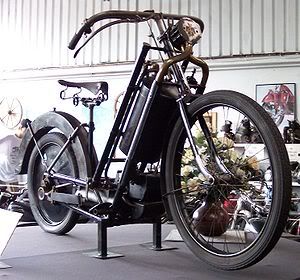Many of you will possibly cite Gottlieb Daimler as the inventor of the motorcycle. Once again, you would be correct in aspect only. Mr. Daimler’s “boneshaker” motor bike was actually a hybrid motor driven bicycle. It sported a wooden frame, wood wheels, as well as wood outrigger wheels to steady the contraption (It’s to be noted, Daimler only accorded this frame to demonstrate his engine. (It is thought he never accepted it would be a working model.)

According to several sources, once Daimler revealed his “motorbike” to the world, De Dion-Bouton brought forth his version and then an American; E. R. Thomas revealed his motorcycle, also utilizing a bicycle frame for his chassis.
The ER Thomas deserves a write up of its own. I’ll get to that at a later date! There was also something known as the Motocyclette, designed by Felix Millet that was introduced one year prior to Hildebrand and Wolfmuller’s. Millet used an aviation style radial five cylinder engine, but this motorcycle never saw mass production.

From 1868 to 1900 is considered the “invention” time period of the motorcycle.
The Hildebrand Brothers along with Alois Wolfmuler and his mechanic, Hans Geisenhof discarded the steam efforts in favor of developing a two stroke gasoline engine. It soon became clear, the larger four stroked engine would be the new wave of the future, so the Hildebrands and Wolfmuler as well as Hans Geisenhof were soon developing water cooled four strokes for their motorcycles.
The second period, titled "Time, Space and Speed," runs from 1894 to 1919. It includes a 1489cc Hildebrand from 1894 that was the world's first series production motorcycle.

The Hildebrand and Wolfmüller was the first mass produced TWO wheeled motor vehicle to be dubbed a “motorcycle.” Actually the Germans were the first to call it “motorrad”, meaning motorcycle in German, the word was now (1894) patented by Hildebrand and Wolfmüller.
So now you understand how this bike became known as the first “Motorcycle.” It was the first practical motorcycle to be put on to the market, and many were built in Germany and France up to 1896.

The frame of the bicycle is formed of four horizontal tubes, between which the four-stroke (1488cc) two-cylinder, water cooled engine is mounted. The down tubes of the frame serve as a lubricating oil reserve.

The machine weighs 115 lb and top speed was 28 MPH. Wolfmüller patented this design (Patent No. 78553, January, 20 1894).

The Hildebrand and Wolfmüller had no clutch. Power was delivered to the rear wheel via locomotive-style pushrods which were linked directly to the engine's pistons. The solid rear wheel was used as a flywheel. The pushrods were returned by the force generated from two large rubber straps - one on each side of the motorcycle.
It is said this motorcycle sported a price tag regarded as high end. This fact along with technical problems such as NO CLUTCH, hindered the popularity of this bike. The partnership between the Hildebrand’s and the Wolfmüller’s came to an end with financial failure the result. The factory closed in 1919.


